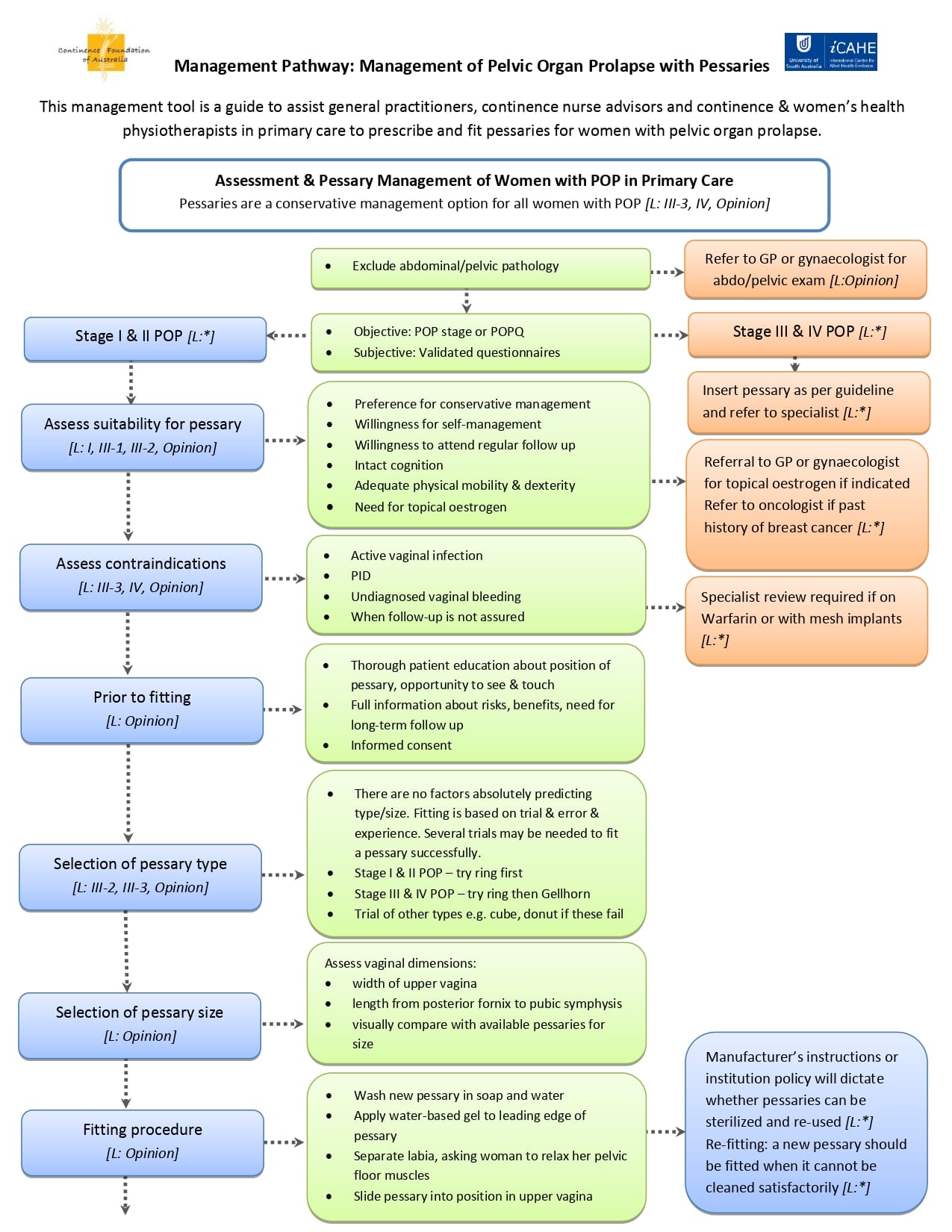refresh physio
pelvic organ prolapse & pessary management
Overview
Pelvic Organ Prolapse & Pessary Management:
With extensive experience in both musculoskeletal & pelvic health physiotherapy, I am uniquely skilled in helping women manage the symptoms of pelvic organ prolapse. In 2024, I obtained a Postgraduate Certificate in the Conservative Management of Pelvic Organ Prolapse from the University of Adelaide, further enhancing my expertise in evidence-based, non-surgical treatment options.
Prolapse can cause discomfort, pressure & changes in bladder/ bowel & sexual function, impacting quality of life & confidence. In certain cases, conservative physiotherapy management can be highly effective in reducing symptoms & improving quality of life—without the need for surgery. My approach focuses on education, pelvic floor muscle training, lifestyle modifications & personalised movement strategies, empowering women to take control of their health & well-being.
Pelvic Organ prolapse & Pessary Management:
Pelvic organ prolapse (POP) is a common condition affecting up to 50% of women who have given birth. It occurs when one or more of the pelvic organs (such as the bladder, uterus, or rectum) descend down towards or beyond the vaginal opening. POP is not life-threatening, but research says up to 75% of women who have it say it has a significant impact on their quality of life.
Overview
Pelvic Organ Prolapse & Pessary Management:
Physiotherapy plays a key role in the comprehensive conservative management of pelvic organ prolapse with the view to improving symptoms, quality of life & avoiding surgery.
Effective, evidence based conservative measures; which can help to reduce bothersome symptoms of prolapse include:
Pelvic floor muscle training (PFMT) – strengthening the pelvic muscles that form a sling under the pelvic organs. Best outcomes are achieved if the programme is supervised regularly by a qualified pelvic health physiotherapist, tailored specifically to the needs of the person, & they comply regularly with their exercises – that’s 4 times weekly over four months. We know from research that strengthening the pelvic floor muscles can reduce bothersome symptoms of POP, & in mild to moderate prolapse can reduce stage of prolapse (by one).
Pelvic Health Physiotherapy
Other Important Lifestyle Changes
- Maintaining a healthy body weight – this can relieve pressure on the pelvic organs. World Health Organization recommends maintaining a Body Mass Index (BMI – a ratio of weight to height) of between 18.5-24.9. Overweight being more than 25, obese being more than 30. Recommended waist circumference is 85cm or less for women.
- Exercising regularly: the World Health Organisation recommends 150 minutes of exercise per week for adults. An increasing body of literature recommends in addition, at least two sessions of resistance training for women, with high intensity, particularly those who are past menopause.
- Maintaining healthy bowel habits & avoiding constipation (knowing how to position yourself effectively on a toilet can make a difference). Repetitive straining on the toilet puts unnecessary pressure on the pelvic organs.
- Understanding how to lift well & knowing how to keep your legs & trunk strong when you lift. Knowing what type of lifting is completely OK & what could potentially put more pressure on your pelvic organs/prolapse.
- Managing/avoiding a persistent cough.
- IN COMBINATION WITH the above, another effective, conservative option is the use of vaginal pessaries.
Pelvic Health Physiotherapy
Vaginal Pessaries
Vaginal pessaries are silicone, hypoallergenic devices that when inserted in to the vagina, can provide a measure of structural support for women who suffer with POP. The pessary management pathway at Refresh Physio follows a shared-care model approach, maintaining good communication with the medical care provider (your GP &/or medical specialist) throughout the process to ensure the safe & effective use of the pessary, while minimizing the risk of complications.
I am pleased to offer vaginal pessary fittings as part of our comprehensive services for women managing pelvic organ prolapse. With my postgraduate certification in the conservative management of pelvic organ prolapse from the University of South Australia, I am qualified to provide tailored, evidence-based solutions that prioritize comfort, effectiveness & safety. A focus of my training was to encourage women to self-manage their own pessaries. Research has shown this not only improves women’s confidence & self- efficacy, but it is more cost effective for them & the healthcare system. Pessaries can be an excellent option for symptom management, especially for women who prefer to avoid surgery or for whom surgery is not an option.






